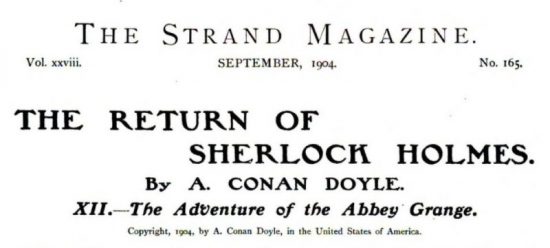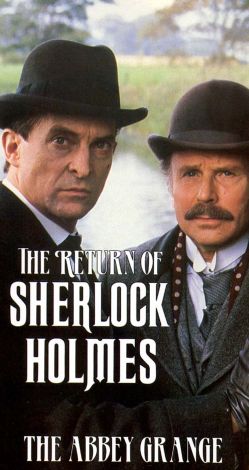
in The World, New York, Fiction Magazine (25 june 1911 ).in Boston Sunday Post (25 june 1911 supplement ) as Masterpieces of Sherlock Holmes No.in Les Premiers exploits de Sherlock Holmes (1909, Félix Juven ) as L'Abbaye de Grange, 4 ill.in L'Abbaye de Grange (1906, Société d'Édition et de Publications Collection Rouge No.in Le Journal (21-25 august 1905 ) as L'Aventure de l'abbaye de Grange.in Owensboro Inquirer (3-6 july 1905 ) 1+ ill.in The Los Angeles Times (30 april 1905 ).in The Return of Sherlock Holmes (1905-1930).in Collier's (31 september 1904 ) 6 ill.in The Strand Magazine (september 1904 ) 8 illustrations by Sidney Paget.Wodehouse Patricia Highsmith Ray Bradbury Raymond Carver Richard Bausch Richard Ford Sherman Alexie Sherwood Anderson Stephen King Stuart Dybek T. Scott Fitzgerald Flannery O'Connor Frank O'Connor George Saunders Grace Paley Guy de Maupassant Haruki Murakami Henry James Isaac Babel James Joyce James Thurber John Cheever John O'Hara John Updike Jorge Luis Borges Joyce Carol Oates Junot Díaz Karen Russell Kate Chopin Langston Hughes Leonard Michaels Leo Tolstoy Lorrie Moore Maeve Brennan Maile Meloy Mary Gaitskill Mary Robison Nathaniel Hawthorne Neil Gaiman O. What do you think about this story? As always, join the conversation in the comments section below, on SSMT Facebook or on Twitter Authors on SSMT Agatha Christie Alice Munro Ambrose Bierce Amy Hempel Ann Beattie Anton Chekhov Arthur Conan Doyle Barry Hannah Bernard Malamud Carson McCullers Clarice Lispector Donald Barthelme Edgar Allan Poe Edna O'Brien Ernest Hemingway Eudora Welty F.


Come back to this lady in a year, and may her future and yours justify us in the judgment which we have pronounced this night.” So long as the law does not find some other victim you are safe from me. Do you find the prisoner guilty or not guilty?” Now, gentleman of the jury, you have heard the evidence. Watson, you are a British jury, and I never met a man who was more eminently fitted to represent one.

And that’s quite a trick on Doyle’s part. It’s a golden move by a detective – you’re acting with supreme kindness but also rebellion against the system. He decides that the guilty party is not morally responsible and offers freedom. The end of “Abbey Grange” finds him acting as a one-man (well, Watson does contribute his opinion as well) courtroom. And quite often, as we see in “Abbey Grange,” he doesn’t even feel compelled to report the results of his detective work to them. He has no need for the police force’s help. One of the enduring qualities of Sherlock Holmes is his existence on the margins of society. The Adventure Of Abbey Grange by Arthur Conan Doyle, 1904Īllowing Sherlock to bypass the judicial system entirely at story’s end


 0 kommentar(er)
0 kommentar(er)
